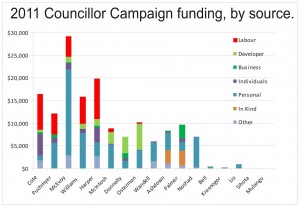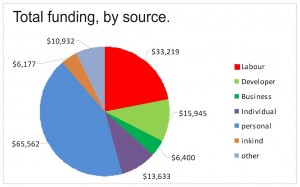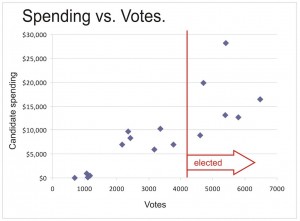In the third part of my ongoing “ending any hope of ever raising funds from anyone to run for anything” series on the New West Municipal 2011 election, we can now cast our skeptical eye towards the election of City Councillors. There were 16 candidates for 6 positions, and it appears the one trend that favours election more than any other is incumbency. Even the new guy elected was a bit of an incumbent. However, if any single race makes the case that Labour Council support is fundamental to securing a seat, this is it.
 |
| click to make bigger… |
Here, once again, are the candidates’ disclosed financing sources by category, reading from left to right by the number of votes received. It is notable that all 6 elected candidates received financial backing from one or more labour unions, and only one of the non-elected 10 did. Also, the top 5 candidates are those that received the most financial support from labour.
In contrast the other “controversial” contribution source, the Development community, provided significant support to two losing candidates, and less substantial support to all but one elected candidate. But as we can see, in total, the amount donated by the Development community is less than half of that from organized labour, and both of those pale in comparison with the amount spent by the Candidates themselves:
A couple of other anomalies we can note: Ashdown and Palmer were no doubt more open about “In Kind” support provided to their campaign than the others. The rules about what represents true “in kind” contribution are rather fuzzy, especially when a volunteer relies on a “professional skill”. If a teenage volunteer sets you up a webpage as a volunteer, it is probably not declarable, but if a Professional Web designer does so as a volunteer, that should probably be declared, but there is a lot of room for grey zone between those extremes.
On a completely unrelated note, what the hell is up with Jaimie McEvoy? $28,000? How does one candidate spend more than three times the average, and about 40% more than the second place spender? Notably, the big anomaly is the amount of his personal money that went into the campaign, so I suppose if he wants to re-invest so much of his Council Stipend on campaigning, then all the power to him, but yikes! He more than doubled the amount spent per vote for any winning candidate, and was well ahead of a couple of per-vote big spenders on the losing side. Maybe he overestimated the challenge that Chuck Puchmayr posed (ultimately, his well-founded support came at the expense of Long-serving councillor Bob Osterman).
Jonathan Cote receives a lot of support from the Labour Council, but he is more notable for the amount of fundraising he received from private donors (disclosure: this includes me). I think this simply comes down to Jonathan’s curb appeal. He is young, bright, and isn’t afraid to speak out on issues important to the community. While working, serving the community, and raising a young family, he is taking courses at SFU towards a certificate in Urban Planning – actually learning about the intricacies of running a City instead of assuming he knows it all. It is hard to walk away unimpressed when talking to Jonathan on a variety of subjects, from breed-specific dog bylaws to infilling ditches in Queensborough, with his knowledge (or at least acknowledgement) of both sides of the issue. The fact he receives such strong support for the community, and the most votes from the community, is enough to prove to a cynic like me that local democracy can actually work.
So I am far from worried about where the money is coming from. I actually think the support that the top 5 candidates get from labour comes more from the DLC’s acknowledged support than the money. Out door-knocking with one candidate this year, I was surprised to hear how many people in Sapperton asked the candidate right out front: “Are you supported by the Labour Council?” Like it or not, New Westminster is a Labour Town, and Labour manages to get the vote out enough that it counts in Municipal elections. Much like support from the business and developer community, the disclosure is more important than the actual money.
This brings me to the issue I actually worry more about: the horrible state of disclosure. Simply put, many of the disclosure forms are either incomplete or factually wrong.
Quick Quiz: how much did Jaimie McEvoy actual raise? Here is the link to his disclosure form. According to Schedule A, he received $6001 from businesses and labour, and $20,276 from Individuals, and no anonymous donations. By my math, that is $26,277, which is not the same as the $25,765 he put on the top of page 4. Add $2,898 (donations under $99) to the $26,277, and you get $29,174. Somewhere, someone forgot to carry a 1, and the disclosure is off by $1000. If $28,176 was spent, where is that $1000 now?
Wayne Wright’s declaration is a mathematical mess. There are very few columns that add up. The number $61301 is apparently the sum of all the numbers in his Schedule A disclosures, including the $10876 from his own campaign fund, but NOT the twe $50 donations that he nonetheless included in the Schedule A2 forms and included in the subtotals, but I suspect those are the same two $50 donations that appear on line B of Schedule A1.
Hanlon’s Razor cuts pretty sharp here.
Chuck Puckmayr’s contributions magically go from $12,095 on Schedule A2 to $12,695 on Schedule A1, with no indication where the extra $600 came from. Bill Harper also gets his math wrong, as his list of Class 1 contributors adds up to $6425, not $6,350, and he offers total contributions (including those under $100) as both $19,814 (Schedule A2) and $20,264 (Schedule A1), although adding it all up, the number seems to total $19,888. Oh, and he had 9 contributions of under $100 each, but they somehow add up to $2651.
It’s not just Councillors. Apparently, the problem with School board is not too many teachers, but too few Math teachers. According to Michael Ewen’s Schedules A1 and A2, $6082+$4080 = $10,862. In Jim Goring math, $3008 = $2938.
Some may see this as nit-picking, but the idea behind disclosure is to create transparency. Bad math can be just that, a simple mistake, but it creates the perception that something fishy is going on, and this is all about perception. I don’t think this is corruption (see Hanlons Razor again), nor do I think failing to carry a 1 on a financial disclosure form is a particularly clever way to get away with something untoward, I think it is just sloppy, and doesnt instill confidence. Sloppy should not be acceptable at this level. It seems petty to worry about a $3000 School board campaign, but now that the Mayoral race is approaching 6 digits, and there are councillors willing to drop nearly $30K for a campaign, things need to be clearly, visibly above board.
Simple solution: that $500 fine for not filing your form before the deadline? The ineligibility repercussions for not completing a form? These should be extended to include forms where the math simply doesn’t work out, because a false declaration, even by mistake, is no declaration at all.

